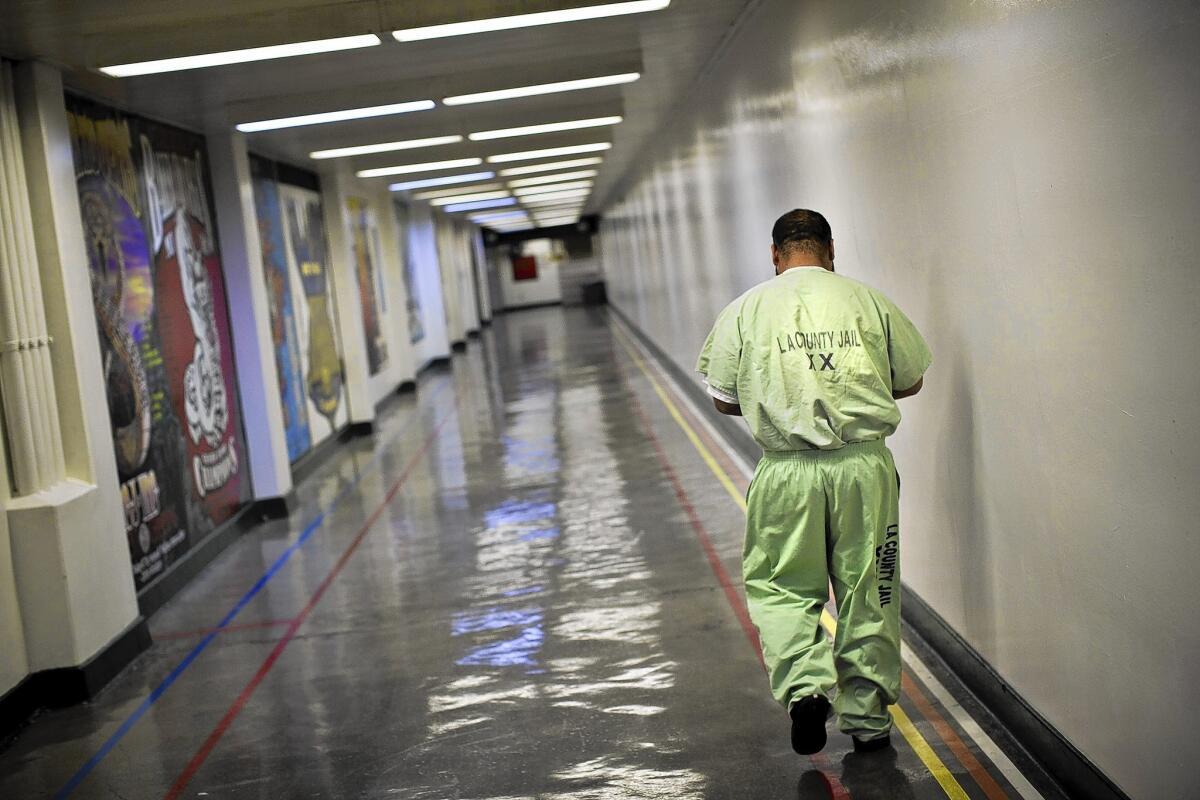Consultant lays out options for $2-billion L.A. County jail overhaul

A consultant hired by Los Angeles County to develop a long term plan for the county’s aging jail facilities laid out options for a roughly $2-billion proposed overhaul of the county’s jail system in a report released Wednesday.
Concerned about deteriorating facilities and poor living conditions for inmates with mental health issues, county supervisors want the Men’s Central Jail in downtown Los Angeles torn down and replaced.
Officials are also contemplating creating a new 1,600-bed women’s jail at the now-vacant Mira Loma Detention Center in Lancaster, to replace the overcrowded women’s jail in Lynwood.
The report by Vanir Construction Management laid out five options, all which involve replacing the Men’s Central Jail, which was built in the 1960s and ‘70s and primarily holds inmates awaiting trial on felony charges.
The new downtown facility would be built next to the current jail site and would hold between 4,860 and 5,860 inmates, depending on the design chosen. The bulk of the beds would be set aside for inmates needing mental health treatment, and a smaller number of beds for those requiring substance abuse and medical care and for high-security inmates.
Four of the five options also include a new women’s jail, at Mira Loma or Pitchess Detention Center in Castaic, or both.
The construction is projected to cost between $1.74 billion and $2.32 billion and take seven to 10 years to complete, depending on the size and configuration of the new building and the location of the women’s jail. The plan would add an estimated $162 to $300 million a year to the county’s jail operating costs.
The proposal is not expected to increase the number of available jail beds countywide, but officials said it would help the county comply with federal mandates on the treatment of mentally ill inmates, and would allow women – who are typically lower risk than male inmates – to be housed in a “rehabilitative, campus style environment” with more options for job training and other programs.
County officials have been talking about modernizing the jails for years, but the issue took on added urgency in the face of federal intervention in state prisons and an investigation into the treatment of inmates in the county jails.
Vanir gave an initial presentation on jail options in July. County officials asked for more information about ongoing operating costs of the new facilities.
County supervisors are expected to discuss the report May 6 and may decide which option, if any, to move forward with.
Supervisor Mark Ridley-Thomas said in a statement that he thought the lowest-cost option, which would place the women’s facility at Mira Loma, “makes sense” and that the design of the downtown facility should be decided “depending on what is most feasible or prudent.”
“My primary goal is to reduce recidivism, and effective jail master planning is one component of that process. …What is certain is that [Men’s Central Jail] has to be replaced and a mental health facility must be built,” he said.
The other supervisors declined or did not respond to requests for comment.
Assistant Sheriff Terri McDonald, who oversees the jail system, argued that in the long run, the plan will save the county money because it will create better treatment programs for inmates and reduce their risk of reoffending.
“Certainly there’s sticker shock associated with this, but there has to be a recognition that we’re making a front-end investment to reduce recidivism and victimization,” she said.
Activists have called on the county to put more money into diversion programs instead of jail facilities, and said mentally ill people should not be jailed at all.
“It’s humanly incorrect, it’s devastating,” said Mary Sutton, an activist with the Los Angeles No More Jails Coalition, at a meeting Wednesday where Vanir representatives discussed the report. “Locking people up with mental health issues — other places don’t do that.”
More to Read
Sign up for Essential California
The most important California stories and recommendations in your inbox every morning.
You may occasionally receive promotional content from the Los Angeles Times.











